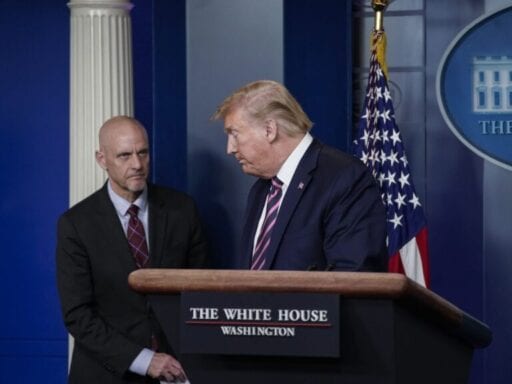Facing criticism over his bleach comments, Trump expressed frustration over the briefings.
President Donald Trump has expressed growing frustration with his daily coronavirus-related press conferences, calling them “not worth the time and effort” Saturday.
The sentiment, coming days after an erratic briefing at which Trump incorrectly suggested that injecting cleaning products could help kill off the coronavirus that causes Covid-19, has been echoed by some Republican allies, who reportedly worry that the conferences hurt the party as a whole.
On Saturday evening, Trump lashed out in a tweet about how the media has responded to his press conferences, calling reporters “hostile,” while suggesting he has helped network news receive high ratings during the Covid-19 pandemic.
What is the purpose of having White House News Conferences when the Lamestream Media asks nothing but hostile questions, & then refuses to report the truth or facts accurately. They get record ratings, & the American people get nothing but Fake News. Not worth the time & effort!
— Donald J. Trump (@realDonaldTrump) April 25, 2020
The tweet came shortly after the White House stated Saturday’s expected daily coronavirus press conference would not take place, and a day after a noticeably shortened conference on Friday, at which Trump took no questions.
Trump eschewed regular press conferences for much of his presidency, but began holding daily updates as the novel coronavirus took hold in the United States. For a time, Trump celebrated these interactions as both a way to speak directly to the American people, and as television ratings bonanzas.
But according to the New York Times, some Republican leaders see these news briefings as potentially sabotaging their party’s plans to keep control of the White House and Senate.
“Now we have the foundation of the campaign yanked out from underneath us,” said Glen Bolger, a Republican pollster, echoing sentiments expressed by some other Republicans who spoke to the Times, all of whom said they fear the tanking economy and Trump’s unpredictable responses will lose the party swing states — and Senate seats — come November.
These concerns came to the fore after remarks Trump made at his Thursday briefing went viral. Speaking off-the-cuff, Trump suggested that household disinfectants — the kind used to remove the virus from hard surfaces — could be injected into infected bodies to fight the coronavirus from within. He likewise promoted sunlight as a potential miracle cure, due to its ultraviolet rays.
Health experts and the chemical companies that produce such cleaners immediately warned that people should never ingest toxic materials, and scientists stated there is no evidence ultraviolet rays can cure Covid-19. Trump later said he had been speaking sarcastically, while White House press secretary Kayleigh McEnany said the comments had been taken out of context.
Trump’s frustrations with the conferences now mirror those of his critics
It remains to be seen whether Trump will resume regular press briefings. Speaking to reporters on Saturday afternoon, McEnany said future briefings are “entirely his decision,” and said that “the president is at his best when he’s speaking directly to the American people” — referring, perhaps, to Trump’s rallies, rather than televised question-and-answer sessions with journalists.
Trump’s current frustration with the conferences — notably that they are “not worth the time” — echoes critiques from his opponents. As Vox’s Zeeshan Aleem has written, these critics argued the frequent misinformation that Trump relayed at these briefings, such as whether the outbreak will get worse and how long social distancing guidelines will remain in effect, made them of little use to the public. And these concerns eventually led to discussions in the media about whether to stop broadcasting them live.
Trump responded to these considerations in late March, by comparing his press conferences to other major television events, like Monday Night Football. As Aleem points out, the president’s response at that time discounted the reason people tune into such briefings during a pandemic; not to see the president, but “because they want to keep up-to-date on coronavirus and the US’s policies on it:”
During these briefings it’s not just Trump who speaks, but his coronavirus task force, which includes top public health officials like Dr. Anthony Fauci, the widely respected director of the National Institute of Allergy and Infectious Diseases, and Dr. Deborah Birx, a physician noted for her work combating HIV/AIDS and the White House’s coronavirus response coordinator.
The coronavirus pandemic has caused an economic crisis, policy chaos at home and abroad, and widespread physical and mental suffering around the globe — it would make sense that millions are tuning in to hear the nation’s top officials provide clear, accurate information on the latest.
As Vox’s Matt Yglesias has written, Trump critics broadly opposed live broadcasts of Trump’s briefings because they believed that they served as “ersatz rallies held for political purposes rather than bona fide attempts to inform the public.”
But now, Trump’s style and bravado has begun to catch hold in unflattering ways. Amid a crumbling economy and ongoing pandemic, his allies seem to be joining the call for a significant change to these press conferences.
Support Vox’s explanatory journalism
Every day at Vox, we aim to answer your most important questions and provide you, and our audience around the world, with information that has the power to save lives. Our mission has never been more vital than it is in this moment: to empower you through understanding. Vox’s work is reaching more people than ever, but our distinctive brand of explanatory journalism takes resources — particularly during a pandemic and an economic downturn. Your financial contribution will not constitute a donation, but it will enable our staff to continue to offer free articles, videos, and podcasts at the quality and volume that this moment requires. Please consider making a contribution to Vox today.
Author: Anya van Wagtendonk
Read More



